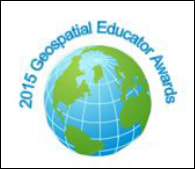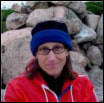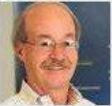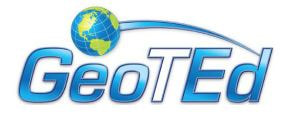2015 National Excellence in Geospatial Education Awards Recipients
The GeoTech Center recognizes those individuals and organizations that have helped support geospatial education. The awards have been created to recognize excellence in geospatial education or support for geospatial education focused on two-year college programs. There are three award categories: 1) Lifetime Achievement in Geospatial Two-Year College Education; 2) Distinguished Geospatial Educator Award; 3) Distinguished Geospatial Education Partner Award. The GeoTech Center received nominations in each category and then determined recipients via an Award Committee. We are happy to announce this years following awardees.
2015 Lifetime Achievement In Geospatial Two-year College Education
|
Tora Johnson has a B. S. in Biology from University of Oregon and an M.Phil. in Human Ecology from College of the Atlantic, and is currently pursuing a PhD in Natural Resource Policy at the University of Maine. Since 1996, she has taught marine, environmental, and geographic information systems (GIS) at the college level. She teaches GIS and environmental studies at UMM and serves as the director of the GIS Laboratory and Service Center.
Before her son was born in 1996, Tora made a career of teaching and crewing aboard several of the large sailing vessels that ply the coast of New England, as well as commercial fishing in Alaska. Tora’s current human ecological research focuses on political conflicts over marine and coastal resources and the uses of maps in decision-making. In-service projects through the UMM GIS Services Center, Tora and her students work with local towns, organizations, and businesses to conserve Downeast Maine’s natural resources, and plan for a prosperous and sustainable future. Tora was the Principal Investigator for a statewide GIS education initiative in GIS education involving nine colleges and universities. Tora also served on the original National Visiting Committee for the GeoTech Center. A writer, Tora’s award-winning book, Entanglements: The Intertwined Fates of Whales and Fisherman, was released in 2005. |
2015 Distinguished Geospatial Educator Award
|
Thanks to the efforts of David Skiles, the Front Range Community College GIS program -- Boulder Campus, is ramped up, robust and running full speed. A GIS Certificate, GIS Fundamental Certificate, and a Natural Resource GIS certificate are currently offered under the Business, Education & Information Technology Department. FRCC BC is in development for an Associate of Science GIS degree.
FRCC GIS classes are offered in the daytime, evening, and on Saturdays. Through Citrix and Go to Meeting technologies, distance learning students take GIS classes and experience the same level of personal attention and mentoring that students in seats receive from in classroom instructors. Dave Skiles utilizes 6 GIS instructors who introduce students to Esri’s ArcGIS Platform, Trimble GPS data collection and other GIS software, along with computer programming and development skills that are needed in the Colorado GIS workforce. Under the direction and mentorship of Dave Skiles, the FRCC BC GIS instructors work closely with Skyline High School in the St Vrain School District and Berthoud High School in the Thompson School District to provide dual enrollment GIS classes for high school students. FRCC BC staff partners closely with Colorado State University Natural Resources Engineering faculty on articulation of GIS skills (and credits) for FRCC students moving to CSU. A 2+2+2 educational flow is in place as students can grow their GIS expertise with 2 years of High school, 2 years of community college and a final 2 years at a state university. Along the way the students have the opportunities to earn GIS certificates, GIS Associates of Science degrees and a bachelor’s undergraduate degree. For the past 8 years Dave Skiles, FRCC GIS Director has partnered with the GeoTech Center on curriculum development, and has been instrumental in working with other Colorado community college GIS faculty and the Colorado Community College System (CCCS) to bring the outdated CCCS GIS courses descriptions for community colleges into the 21st century with GIS technologies and expertise to meet current and future workforce demand. The FRCC Fort Collins and FRCC Westminster campuses are now building out their GIS offerings. The Front Range Community College GIS program on the Boulder Campus is successful due to Dave Skiles’ thoughtful commitment to education, long range planning, and close partnerships with government, business and education in the community. Dave has brought real world and real workforce needs into the education setting. |
2015 Distinguished Geospatial Education Partner Award
|
Virginia Space Grant Consortium: GeoTEd http://www.vsgc.odu.edu
The Expanding Geospatial Technician Education. Through Virginia’s Community Colleges (GeoTEd) project has made significant contributions in support of geospatial education at two-year community colleges in Virginia and the surrounding region. GeoTEd faculty have served in state and national projects including providing significant contributions to the development of the National Geospatial Technology Competency Model (GTCM) model courses. GeoTEd faculty have also participated in iGETT workshops and ESRI’s T3G Institute, and have effectively integrated the content into their curricula and shared with other faculty. The GeoTEd team has provided hands-on intensive geospatial professional development to 44 educators from 21 different community colleges in six states including eight dual-enrollment high school teachers. These Institutes are one-week residential workshops with a two-year commitment by the participants. Hosted by Virginia Tech and led by community college faculty, the GeoTEd Institutes have received excellent evaluation results and have demonstrated positive impacts on faculty competencies in geospatial technology. Since the two GeoTEd Institutes were first offered, six new Certificate Program in GIS and three new GIS Specializations are now in place in Virginia's community colleges. At least 20 newly developed GIS-prefix courses are now being offered and with an interdisciplinary approach, GeTEd has supported and mentored the faculty integration of geospatial technologies into courses such as fire science, computer science, information technology, business, nursing and more. GeoTEd has led to hundreds of additional students using geospatial technologies through these courses. GeoTEd has established a strong partnership with geospatial professionals from business, industry, and government agencies as demonstrated by the membership of the 25 member Advisory Committee. A partnership with NASA Langley Research Center has led to the development of a one-credit geospatial service-learning course. Based on this successful model, GeoTEd is developing a 3-credit service learning course to assess sea level rise on Virginia’s Eastern Shore in partnership with NASA Wallops Flight Facility. |





